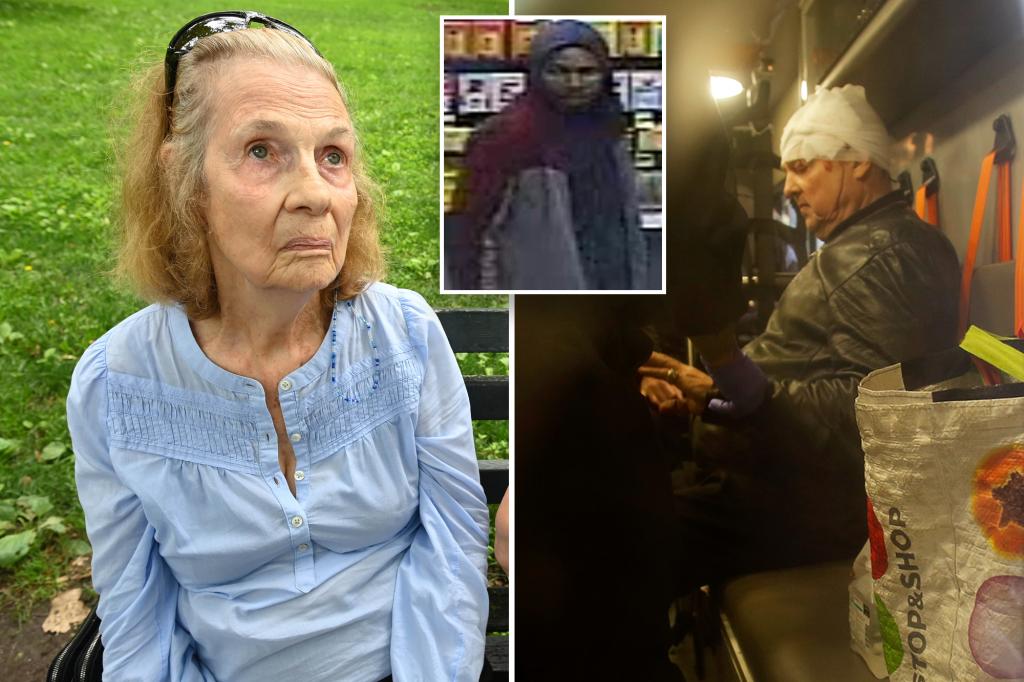
The most vulnerable New Yorkers are taking it on the chin – and everywhere else – as felony assaults against seniors have doubled since 2019, The Post has learned.
The NYPD has recorded 1,228 felony assaults against people aged 65 and over so far this year — compared to only 608 in pre-Covid 2019.
The shocking surge comes as assaults in NYC overall are slightly down, by .3%.
Things have gotten so bad that some adult children have hired aides to keep their elderly parents from being Gotham’s next crime victim.
An Upper West Side resident and retired principal who identified herself as Eileen, 87, said her son hired someone to be with her when she takes walks.
“When you get to be 88, you realize you have to protect yourself from your environment in ways younger people don’t know,” the octogenarian said. “Because they are not as easily assaulted as somebody my age.”
Attacks on the elderly so far this year run the gamut from random punches to bludgeonings to slashings, according to the NYPD. Some of the most shocking include:
- A 66-year-old woman was struck in the head by a stranger wielding a golf club around 7:30 p.m. on Jan. 25 in an unprovoked attack in the subway system, police said. The woman was left with a gash on the left side of her head, police said.
- An 86-year-old woman was shoved from behind into a pole — breaking her teeth — in a random attack near the exit of Morton Williams on Third Avenue near East 63rd Street on March 23, cops said.
- A 67-year-old man was slashed in the the head by a stranger with a large knife while riding the subway in an unproked attack on a C train in Brooklyn on March 15, cops said. The suspect was arrested when passengers flagged down cops at the next stop.
- A 72-year-old woman was randomly kicked down a staircase at the Jackson Heights-Roosevelt Avenue subway station in Queens just after 11 p.m. March 1, cops said. The attacker said nothing before attacking the victim, sending her tumbling backwards down the stairs, cops said. The badly bruised victim was taken to the hospital.
The NYPD has made arrests in 962 of the 1,228 assaults on seniors this year — 78% of cases, a spokesperson said. More than half of the people arrested had a prior arrest record.
The spokesperson stressed that the entire criminal justice system has to work to bring the assaults under control.
“The NYPD has played their part, arresting individuals who are assaulting vulnerable, elderly New Yorkers,” the spokesperson said. “Our city must be safe for all New Yorkers, regardless of their age, and we need every aspect of the criminal justice system to play their part to ensure that we stop the revolving door for recidivists.”
Poland native Krystyna Gajewska, 66, works as Eileen’s caregiver, said the two are vigilant.
“The bottom line — we don’t go at night,” she said. “We stay home.”
The caregiver called for more cops walking the beat.
“Not sitting in the car — walking around, looking,” she said, describing what good cops do. “There are so many [people] that have mental problems. There’s so many homeless.”
Upper West Sider Paul Trahan also makes sure to be home when night falls.
“I’ve made it a point to stay home at night,” said Trahan, 86. “I’m not nearly as well physically able to deal with any such problem now. So that’s all the more reason for me to stay home — and say the right prayers.”
Bronx native Gloria Wiggins, 80, had some advice for seniors: keep your head on a swivel.
“My neck is killing me,” she said. “I’m constantly looking around and watching.”
Riverdale, Bronx, resident George Timko, 77, was saddened to hear about an increase in assaults against the elderly but said he didn’t plan to make any changes to his life in the city.
“I don’t feel less safe,” he said. “I’ve lived most of my life in the city … I go about my day in the city.”
One policing expert suggested a public awareness campaign to make sure seniors know they’re in danger.
“You can’t have a 100% increase mid-year without acknowledging that this is a significant issue,” said Chris Herrmann, a former NYPD criminologist who is now a professor at John Jay College of Criminal Justice.
“I wouldn’t fearmonger and say ‘stay indoors’ but the more simple stuff,” he said. “Spend more time in groups, be aware of your surroundings.”

